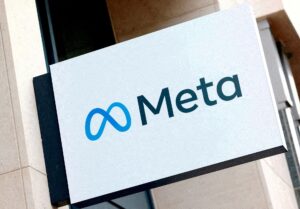Meta’s Zuckerberg says its focus on AI will increase the company’s spending significantly.
Meta Platforms disappointed investors on Wednesday with forecasts of higher expenses and lighter-than-expected revenue, knocking nearly $200 billion off its stock market value and raising fears the surging cost of AI is outpacing its benefits.
Shares of the Facebook and Instagram parent dropped about 15% in extended trade following the report, its market capitalisation plunging to about $1 trillion.
The late-day slump in Meta’s stock value was just short of the $232 billion one-day loss suffered on Feb. 3, 2022, which was the record one-day loss of market capitalisation for any U.S. company.
Alphabet shares fell 3% in extended trade and Microsoft declined 2%, with concerns that Wall Street may have underestimated the cost of the AI race hitting those Big Tech companies ahead of their reports on Thursday.
Nvidia lost 1.4% and Amazon dropped 2.6%.
Meta said it expects April-June revenue in the range of $36.5 billion-$39 billion, with a midpoint of $37.8 billion, compared with analysts’ estimates of $38.3 billion, according to LSEG data.
The company raised its forecast for expenses this year to support investments in new AI products and the computing infrastructure needed to support them, adding that it expected spending would continue to increase next year.
It raised its 2024 total expense forecast to $96 billion-$99 billion, from $94 billion-$99 billion. It also expects 2024 capital expenditure to fall within a range of $30 billion-$40 billion, up from its earlier forecast of $35 billion-$37 billion, it said.
CEO Mark Zuckerberg told analysts on a conference call that the focus on AI would “grow our investment envelope meaningfully before we make much revenue from some of these new products.”
Zuckerberg’s comments and the quarterly results tempered expectations for Meta’s AI investments after a series of smash-hit quarters for the social media giant. Meta enjoyed the biggest one-day gain in market capitalisation in Wall Street history after its last quarterly report, when it posted robust results and announced a first-ever dividend.
“Investors are skeptical of the growing AI spending. Some of those investments could take years to pay off,” said Jasmine Enberg, principal analyst at Insider Intelligence.
“But Meta is in the AI race to win it, and Meta AI could be a dark horse. It has a built-in audience through its existing apps, and it will have an advantage in eventual monetisation through its ad ecosystem,” Enberg said.
The company has been updating its ad-buying products with AI tools and short video formats to boost revenue growth, while also introducing new AI features like a chat assistant to drive engagement on its social media properties.
It announced last week that it is giving its Meta AI assistant more prominent billing across its suite of apps, meaning it will start to see how popular the product is with users in the second quarter.

“For all Meta’s bold AI plans, it can’t afford to take its eye off the nucleus of the business – its core advertising activities,” said Sophie Lund-Yates, lead equity analyst at Hargreaves Lansdown.
The company’s metaverse-oriented Reality Labs division missed expectations for the first quarter, posting sales of $440 million. Investors had been expecting $475 million, according to LSEG data.
The unit’s sales leaped 30% from the year prior, but were still below the average revenue of $523 million posted in previous first-quarter reports since Meta started disclosing Reality Labs revenue in 2021.
Reality Labs lost $3.8 billion in the quarter, putting it on track this year to match the $16 billion it lost over the course of 2023.
Zuckerberg also described potential monetisation plans for Meta’s AI chatbot, such as using it for business messaging and customer support.
Meta theoretically stands to benefit from regulatory pressures bearing down on its Chinese-owned short video competitor TikTok, which is facing the threat of a U.S. ban, although Meta CFO Susan Li told investors she was not yet ready to assess the business impact of the potential setback for its rival.
Meta posted first-quarter revenue of $36.5 billion, roughly in line with expectations of $36.2 billion, according to LSEG data.
Meta’s daily active people (DAP), a metric it uses to track unique users of any one of its apps Facebook, Instagram, Messenger or WhatsApp in a day, grew 7%.
DAP grew 8% in the preceding quarter.
Meta disclosed only the DAP figure for user growth, a first for the company. It said earlier this year that it would no longer break out numbers for flagship social network Facebook, whose growth has slowed in recent years.




